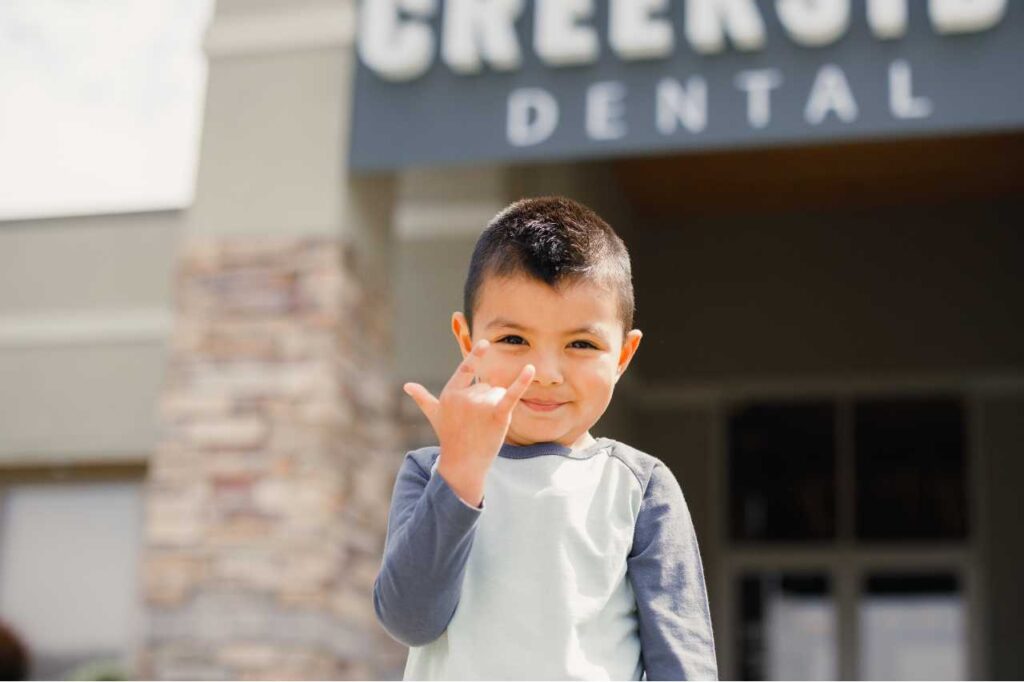At what age should I bring my baby in to the dentist?
As a general rule, it is best to bring your baby in once they get their first tooth. This establishes a routine and reduces dental anxiety later on into the toddler years. It is then strongly encouraged to take your child for a dental exam appointment every six months; regular dental exams can prevent dental emergencies that may require more extensive treatment.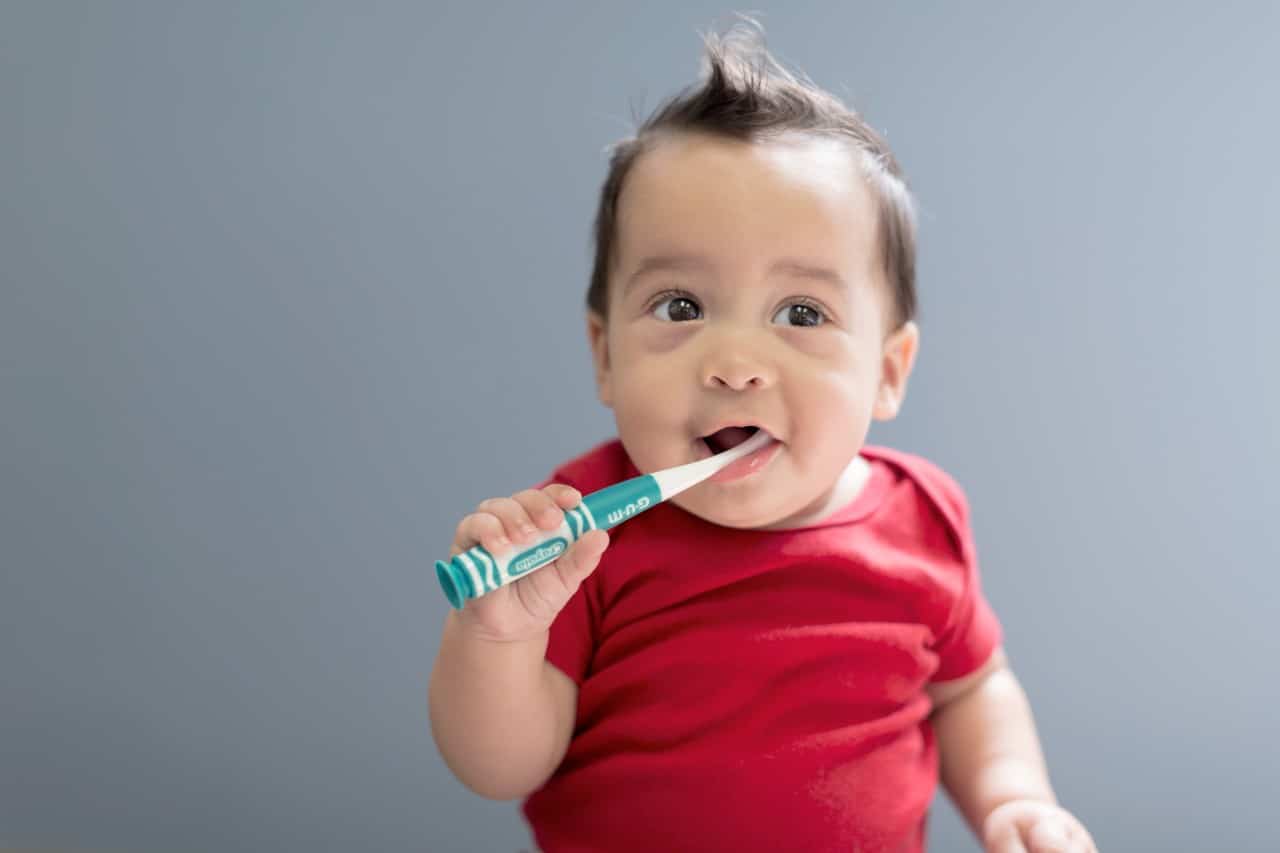
Why do I need to floss my baby’s teeth?
For the same reason you floss adult teeth, the toothbrush cannot reach the in-between teeth to remove all plaque. Decay is commonly seen in children between their back molars.
So, what is plaque?
Plaque is a mixture of food particles and saliva that sticks to your teeth. It is white, but will absorb the colors of the food you eat if left un-brushed. Plaque rebuilds every four to six hours after brushing, so it is very important to brush twice daily.
What is a cavity?
A cavity occurs when plaque sits on the tooth for too long. Cavities are permanently damaged areas on the hard surface of teeth that develop into tiny holes or openings. Cavities are caused by a combination of factors, including bacteria in your mouth, frequent snacking, sipping sugary drinks, and not cleaning your teeth well enough.
If I’m brushing my teeth twice a day, when do I need to floss?
Flossing should be an essential part of your everyday dental hygiene routine because the toothbrush bristles are not able to get the areas between the teeth, which can cause plaque to build up, leading to… yep, cavities!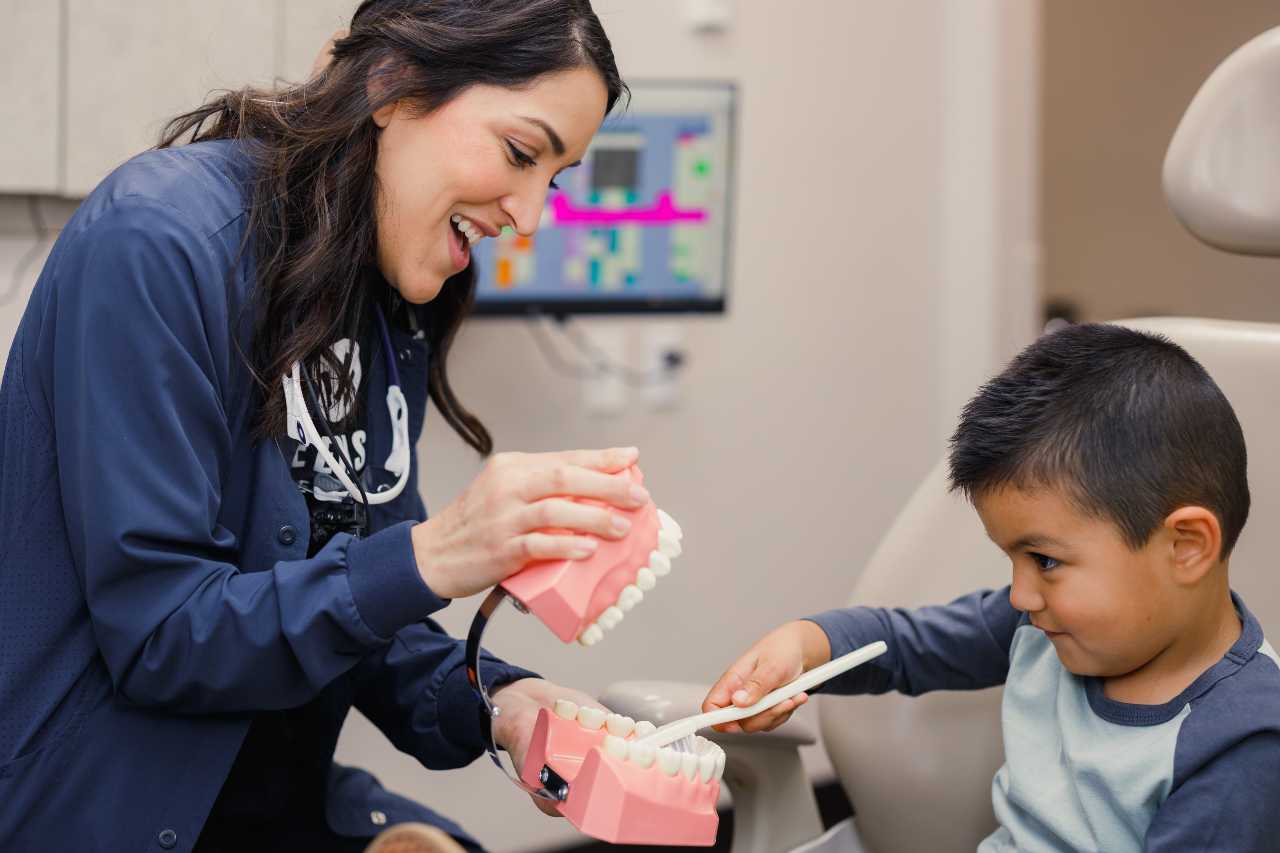
Why do my gums bleed when I floss?
Bleeding during flossing is caused by lack of stimulation. Gums needs to be brushed and flossed daily to reduce inflammation caused by the bacteria in plaque. The best way to prevent this happening is to ramp up your oral care routine – brush your teeth twice a day and floss at least once a day. Oh, and of course see your dentist regularly!
What can I do for my teething baby?
To help your baby’s gums feel better and alleviate any discomfort, massage their gums with either your finger or a damp, cool washcloth. Teething toys are useful, but do NOT coat them in sugar or honey; this can cause decay.
Why is nursing/bottle feeding discouraged before bedtime?
Both breast milk and formula contain sugar. If the child is put to sleep with a bottle or right after nursing, it exposes the teeth to those sugars throughout the night. This heightens the risk for what is called ECC, or Early Childhood Caries; this is the most common preventable disease among children. ECC is a chronic disease caused by certain types of bacteria that live in your mouth; ECC can cause lesions, disruption of tooth growth and development, pain and infection if left untreated. In fact, another name for ECC is Baby Bottle Tooth Decay!
Why is it best to drink certain juices from a cup and not a sippy cup?
While we discourage regular consumption of sugary drinks, the sucking motion of drinking from a sippy cup exposes your teeth to more sugars than drinking from a regular cup would. It is best to present juice or sugary drinks to your child at meal time in a regular cup; frequent sipping increases the likelihood of decay occurring.
What is the correlation between decay, diet, and frequency?
Diet and frequency play a huge role in your child’s overall oral health. The sugars present in foods and drinks create an acidic environment; frequent snacking increases these acid attacks, raising the risk of decay. Avoiding sugary, sticky foods, as well as foods high in carbohydrates will reduce this risk.
What is the purpose of fluoride?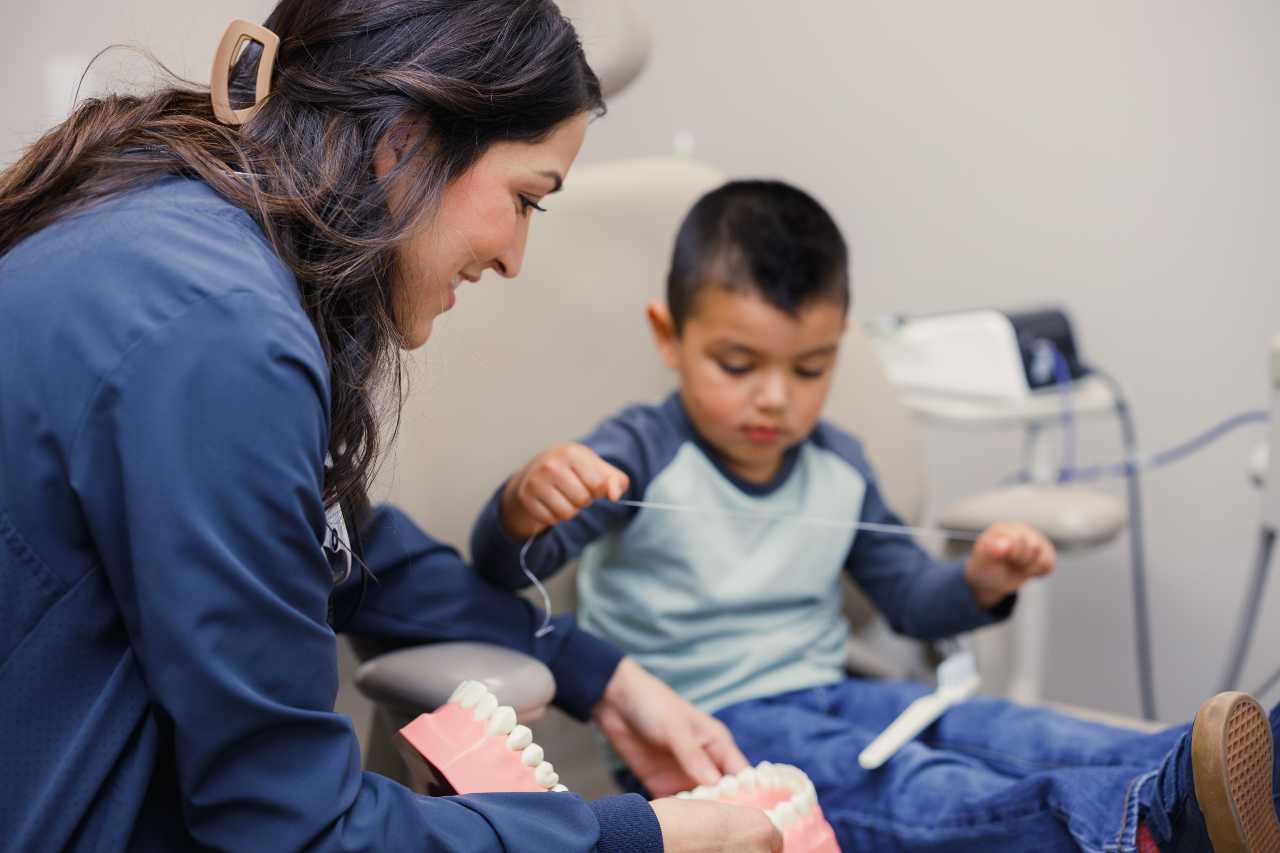
Fluoride is a mineral found to strengthen your teeth, if used in the correct amount. Think of fluoride as vitamins for your teeth that help to strengthen your enamel. It is also important to note that children under six years of age should not use fluoride yet, as they may ingest it. Swallowing fluoride can cause nausea or abdominal discomfort.
How often do you take x-rays at dental appointments?
For ages 3-12, we take two images twice per year. These x-rays allow the doctor to view in between the teeth, a common area for caries in this age group. Once children are 12 and have both molars present, we will start taking four images. Once the four images are taken, x-rays will only be done once a year; this is because children at this age typically have a more established oral hygiene regimen. Visual exams will be completed between x-rays.
What is the Doctor’s role regarding x-rays?
After images are taken, the Doctor will come in to complete the exam. At this time he will evaluate the teeth for any possible treatment needed. During the exam the Doctor will use a mirror and a “tooth counter” to check for decay or any other oral red flags.
What are sealants?
Sealants are a preventative treatment used to protect the deep pits, grooves and ridges on the back teeth. The basic anatomy of teeth increases the risk for decay on the chewing surfaces. Sealant material is placed on the surface of the molars, preventing plaque from accumulating in these areas. Once cured and dried, the sealant becomes a barrier to protect the chewing surface. Sealants are clear-colored and never noticeable.
At what age is it acceptable to stop checking my child’s brushing habits?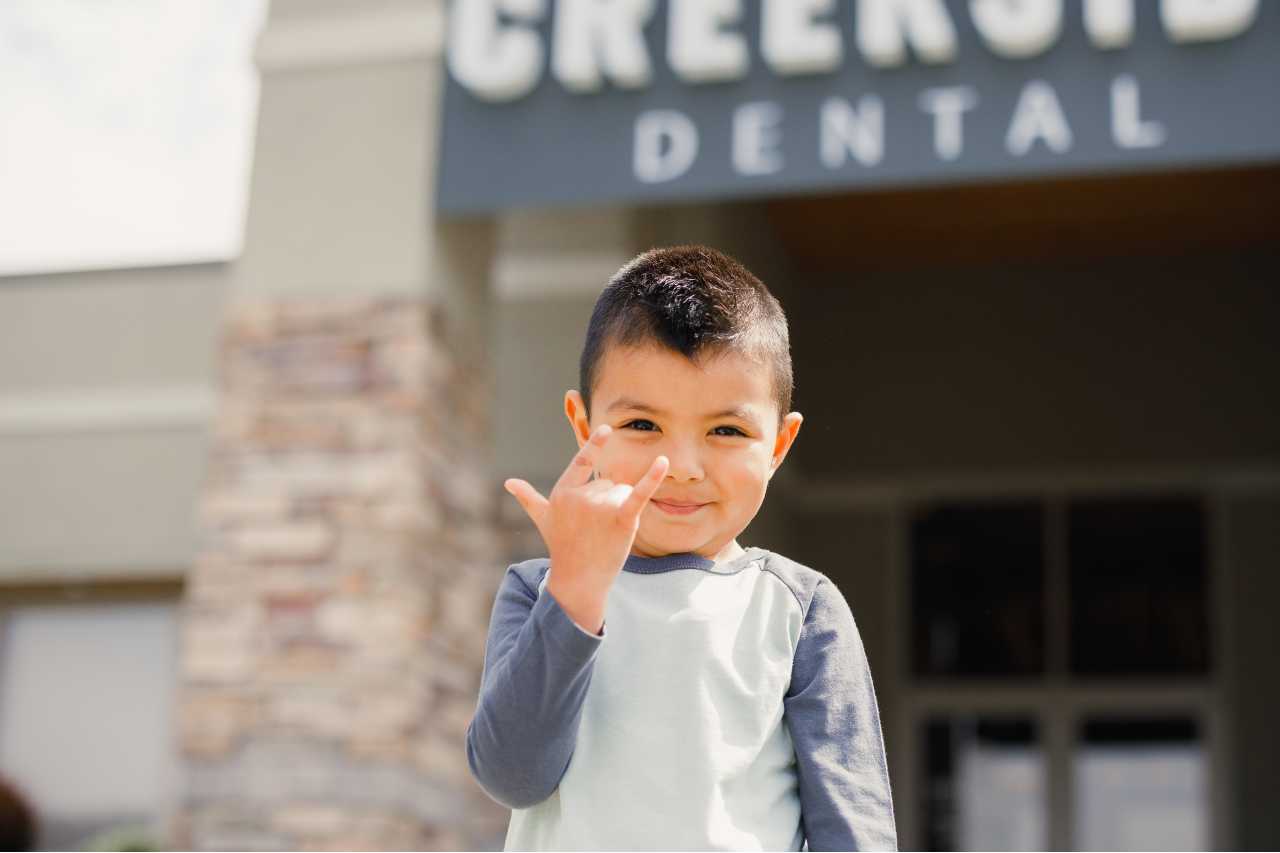
We encourage you to check over your child’s brushing and help them until about age eight. From age 0-8 the child is learning how to care for their teeth and will still need some assistance; it is important for parents to help the child develop strong oral hygiene habits during this time. Take time to lift your child’s lip to ensure all plaque is removed from the gum line (this area is commonly missed). Set a good example by brushing together twice daily and flossing once per day.
At Creekside Dental, we LOVE children!! It is especially rewarding for us to see them grow up with healthy smiles!
